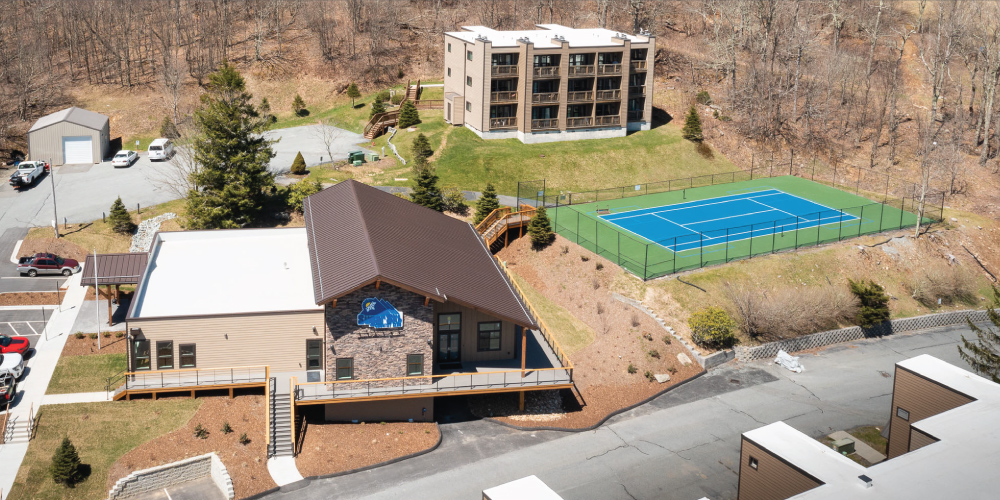Every detail matters in a commercial construction project, from the materials used to the layout of your space. Before you break ground, one crucial step creates the foundation of a successful product: the site plan.
A commercial site plan is a meticulously detailed drawing of your property that outlines the intended use of every square foot. It’s more than a pretty picture. It’s a strategic map that optimizes your plot’s efficiency while ensuring your new space complies with all relevant building codes and regulations.
In this post we’ll cover the importance of a commercial site plan, what should be included, and key considerations that will make your site plan — and your final project — perfectly optimized for your business.
What Is a Site Plan?
Also known as a plot plan or a block plan, a commercial site plan is a large-scale drawing that acts as a blueprint for a property’s development. It shows the existing condition of your land and visualizes how you want it to look in the future.
The site plan’s primary purpose is as a visualization tool. It lays out everything your builder will do to your property, including where they will place your building, parking areas, and landscaping. Seeing the plan on paper can help you and your builder identify potential challenges or areas where you can improve the plan before they begin construction.
A site plan usually includes:
- Property boundaries and dimensions
- Existing and proposed structures
- Parking areas
- Driveways and access points
- Landscaping elements
- Existing and proposed utility lines
Reviewing the site plan before construction keeps everyone on the same page, from you to your builder to the permitting authorities. In fact, you’ll likely need to submit a site plan to obtain the necessary building permits for your project. The site plan shows authorities that your plan adheres to local zoning regulations, building codes, and accessibility laws.
7 Essential Factors to Consider in a Commercial Site Plan
A site plan is an opportunity to optimize all the critical elements of your commercial project. This is where you can make changes to improve workflow and efficiency for your organization. When reviewing your site plan, you’ll want to consider some key elements.
1. Traffic Flow
A well-designed site plan prioritized smooth and safe traffic flow for vehicles and pedestrians. This might include designating separate lanes for entering and exiting vehicles or creating drop-off zones.
2. Accessibility
Your site plan should factor in accessibility requirements, such as accessible parking spaces, ramps, and clear signage. You’ll also want to ensure routes to your entry points are accessible.
3. Parking
An adequate number of parking spaces is essential for operations and customer satisfaction. Your site plan should anticipate traffic volume, including employee and customer parking requirements. Optimizing the parking layout can maximize the number of spaces while minimizing the amount of land you must dedicate to parking.
4. Service Access
If your business relies on deliveries or service vehicles, your site plan should accommodate them. You might need to create designated loading zones, separate delivery access points, or spaces large enough for semi-truck maneuvers.
5. Landscaping
Landscaping should improve your property’s aesthetic, but it can do a lot more than that. Great landscaping can provide shade that reduces energy costs or create surfaces that manage stormwater runoff. You might consider incorporating landscaping that improves sustainability, like a green roof or a rain garden.
6. Expansion
This may not be the last time you’ll need a builder. Future business growth might require another building expansion. Your site plan should consider potential growth plans, such as leaving room to expand structures or parking areas. An experienced commercial builder will help you design spaces that can be adapted to the changing needs of your business.
7. Compliance
Your site plan should adhere to all local zoning regulations and building codes. It will detail setbacks from property lines, building height restrictions, and accessibility standards. Working with a builder familiar with local regulations can ensure your plan meets all these requirements.
Let VPC Builders Create Your Perfectly Optimized Site Plan
A well-crafted site plan is essential to a successful commercial construction project. At VPC Builders, we work closely with our clients, architects, and engineers to create a plan that marries your vision with local regulations. We consider everything from traffic flow to shrub placement to ensure your commercial property is optimized for efficiency and future success.
If you are dreaming about what you can do with your commercial property, contact VPC builders and schedule a consultation with our team. We’d love to guide you through creating a site plan, answer any questions, and help you move on to the next steps in the construction process. Let’s start working on your new building today.

